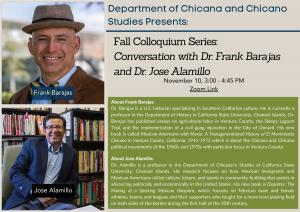Event Date:
Event Date Details:
Please click the Zoom Link to participate in the colloquium.
Event Location:
- Zoom Conference
Event Price:
Free
Event Contact:
Ralph Armbruster-Sandoval, armbruster@ucsb.edu
Related Link:
- Fall Colloquium
- Colloquium
- Fall 2021
Please join us for an enlightening colloquium with Drs. Frank Barajas and Jose Alamillo, from CSU Channel Islands. The event will be held online through Zoom on November 10th, 3:00 PM.The discussion will be hosted by CHST Department Chair Dr. Ralph Armbruster-Sandoval and Dr. Mario Garcia, and the topic of the conversation will the new books published by the two professors. Dr. Frank Barajas' book is titled, Mexican Americans with Moxie: A Transgenerational History of El Movimiento Chicano in Ventura County, 1945-1975. Jose's book is titled, Deportes: The Making of a Sporting Mexican Diaspora
About Frank Barajas:
Dr. Barajas is a U.S. historian specializing in Southern California culture. He is currently a professor in the Department of History in California State University, Channel Islands. Dr. Barajas has published essays on agricultural labor in Ventura County, the Sleepy Lagoon Trial, and the implementation of a civil gang injunction in the City of Oxnard. His new book is called Mexican Americans with Moxie: A Transgenerational History of El Movimiento Chicano in Ventura County, California, 1945-1975 which is about the Chicana and Chicano political movements of the 1960s and 1970s with particular focus in Ventura County.
About Jose Alamillo:
Dr. Alamillo is a professor in the Department of Chicana/o Studies at California State University, Channel Islands. His research focuses on how Mexican immigrants and Mexican Americans utilize culture, leisure, and sports in community-building that assists in advancing politically and economically in the United States. His new book is Deportes: The Making of a Sproting Mexican Diaspora, which focuses on Mexican male and female athletes, teams, and leagues and their supporters who fought for a more level playing field on both sides of the border during the first half of the 20th century.




